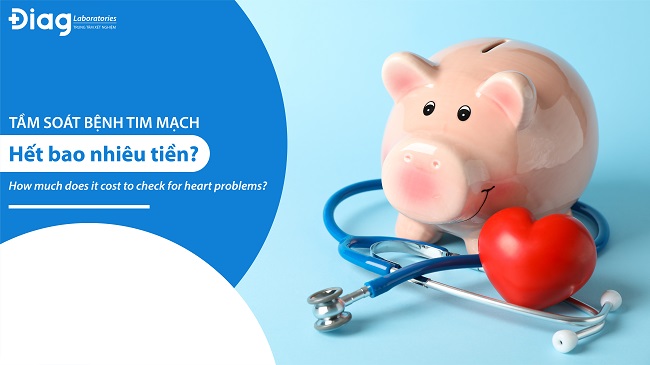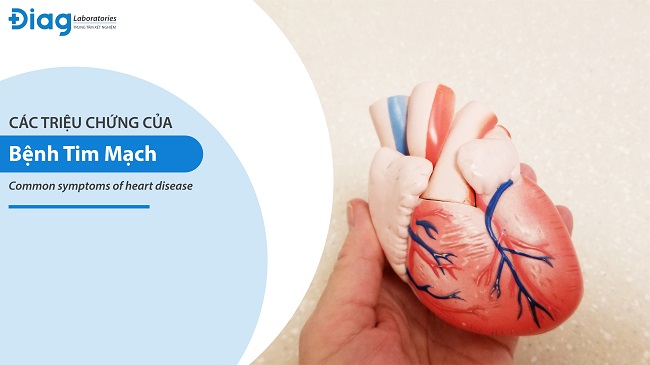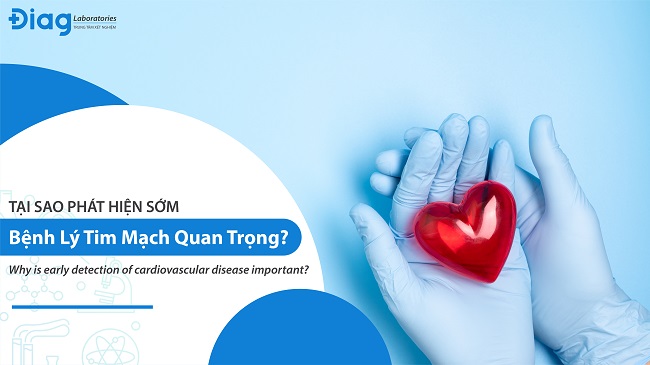According to published data from the Vietnam Society of Cardiology, currently, in Vietnam, 25% of the population has cardiovascular diseases and hypertension. In particular, the average number of people dying from cardiovascular diseases each year reaches more than 200.000, higher than the number of deaths from cancer, and the age is also getting younger.
Notably, many cases subjectively ignore the initial symptoms and only go to medical centers for examination when the disease has progressed seriously. This makes the treatment process more complex and can not achieve the desired effect. It also affects the patient’s quality of life and even entails huge financial expenses for treatment. 
Name of image: How much does a cardiovascular disease test package cost?
Facing that situation, the leading Diagnosis-Medical Center in Vietnam, Diag Laboratories, launched a cardiovascular disease screening package with 11 comprehensive tests, helping Vietnamese people to recognize early and correctly diagnose the risk of cardiovascular diseases.
- Test package name: Cardiovascular diseases screening package
- Cost: 550,000 VND/pack
1. Test’s purpose

Name of image: Routine cardiovascular testing helps to detect and prevent diseases in time
Actively check to assess the overall cardiovascular problems of the test takers. Therefore, early evaluate the risk of illness to develop effective risk prevention solutions or suggest timely treatment in case the disease is found.
2. Who should get testing?
- Men and women of all ages
- Elderly
- People with heart disease or at risk of complications such as diabetes, hypertension, and high blood cholesterol levels.
- Experiencing at least 2 of the common symptoms (mentioned below).
3. Common Symptoms 
Name of image: Monitor abnormal manifestations of the body to promptly screen for cardiovascular disease
If at least 2 of the following symptoms appear simultaneously, people should go for screening to detect cardiovascular disease promptly.
- Shortness of breath
People with heart disease often experience shortness of breath on exertion, lying down, or going to sleep.
- Heaviness or tightness in the chest
This is a common sign of heart disease. The patient feels angina in the area below the sternum. The pain usually lasts 10 minutes and repeats. In persistent chest pain, the patient must rest absolutely and quickly seek medical attention because this can signify a heart attack.
- Edema
Swelling due to fluid retention is a characteristic sign for patients with heart failure. When blood out of the heart slows, blood returning to the heart through the veins becomes congested, causing fluid to build up in the tissues. The kidneys cannot excrete salt, and water also causes water retention in the tissues causing the patient to become edematous.
- Tired
Unexplained fatigue often occurs when body parts do not get enough oxygen because the heart has a reduced ability to contract. If this happens often, we must check for heart problems as soon as possible.
- Persistent cough or wheezing
Different from asthma or chronic obstructive pulmonary diseases, coughs caused by heart disease are often dry or may have white or thick mucus, which may worsen when lying down or just getting out of bed.
- Anorexia
Under the impact of congestive heart failure, fluid will accumulate in the liver or digestive system of the patient. As a result, the patient no longer has an appetite and eats less. If there are additional symptoms of fatigue to the point of not wanting to eat, the patient should see a cardiologist.
- Nocturia
Frequent urination at night is an essential sign of heart failure. This happens due to the displacement of water that accumulates in the body, causing edema in many parts of the kidneys through the blood vessels.
- Heart arrhythmia
The cause of tachycardia is to compensate for the reduced pumping function. Symptoms such as abnormal palpitations and hearing the heartbeat like palpitations need attention from the patient.
- Worried
This is one of the common signs that you are suffering from heart failure but is often overlooked. Symptoms such as rapid breathing, irregular heartbeat, and sweaty palms are often confused with signs such as anxiety or stress. Therefore, if you or your loved one has been feeling anxious or insecure lately, plus one of the symptoms mentioned above, it is essential to get checked out as this could very well be a sign of heart failure.
- Frequency of implementation
Cardiovascular screening is preferably done twice a year to proactively detect, prevent and minimize unwanted complications caused by the disease.
4. Details of Tests and Results Interpretation

Name of image: How to read test results through diagnostic parameters
For the cardiovascular disease screening package of Diag Laboratories, patients will be conducted a total of 11 types of tests:
- Complete blood count: Hemoglobin, White blood cells, platelets. The results make it possible to know the infection status and dengue fever early, one of the pre-operative tests.
- Cholesterol levels in the blood. This high index will increase the risk of cardiovascular diseases such as atherosclerosis and stroke.
- HDL cholesterol levels. The concentration index reflects the high risk of cardiovascular diseases.
- LDL-cholesterol. It was only increased to reflect the risk of cardiovascular diseases.
- Triglycerides (the level of fat storage in the body). A high index is associated with an increased risk of cardiovascular disease.
- High-sensitive C-Reactive Protein (CRP) concentration. Low levels of CRP in the blood are associated with an increased risk of cardiovascular disease.
- Homocysteine. This index helps detect a deficiency of folate or vitamin B12, an indirect cause of cardiovascular diseases.
- HbA1c. This index measures the blood sugar levels attached to the body’s hemoglobin molecule over 3 months. Therefore, it helps early detect prediabetes or uncontrolled diabetes, a common type of complication of heart disease.
5. Frequently Asked Questions
5.1 If palpitations are frequent, is it a sign of cardiovascular disease?
Palpitations are nonspecific symptoms that occur when the heart’s rhythm is abnormal. It can be caused by caffeine, a side effect of medicines, everyday psychological stress, or a sign of coronary artery disease, cardiomyopathy, and heart valve disease. If the condition persists with the addition of one of the common symptoms, see your nearest Diag Laboratories medical diagnosis center for a cardiovascular screening test.
5.2 Which Diag Laboratories branches are these tests performed?
All Diag Laboratories medical diagnosis centers nationwide have the capacity and equipment to perform this test package. Visit https://www.diag.vn/chi-nhanh to find the branch closest to your location.
5.3 When can I come in for a test?
To provide the best testing service, eligible for all needs of patients, Diag Laboratories is open every day of the week, which:
Mon-Sat: 5.30am – 7pm
Sunday: 5.30am – 12.00pm
5.4 Where can I book a test schedule?
You can contact the hotline at 1900 1717 or visit the website www.diag.vn for consultation and schedule an appointment as soon as possible.
Proactive cardiovascular screening helps bring assurance in life and health care habits for you and your loved ones. Select health, select Diag Laboratories.

 1900 1717
1900 1717 

